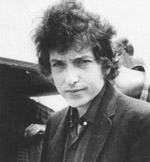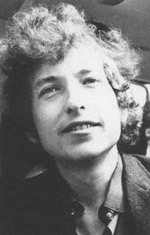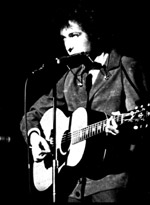Ragamuffin Minstrel Boy | |

| When did you first hear Bob Dylan, and what was your opinion? It's a question I think everyone should be forced to answer. Especially if they are fifteen and have never heard Bob Dylan. Or are thirty four and your opinion is still dismissive. I think I had heard Bob Dylan by the time I was fifteen. I know I had heard him by the time I was twenty, and I know too that my opinion of him then was... shabby. I know that at twenty I was foolish about a great many things, but you know, that one makes me blush the most. Except obviously it doesn't, because I had great reasons for hating Bob Dylan when I was twenty, just as I had great reasons for hating Bob Dylan when I was fifteen. Or at least I think I did. My memory, as already hinted at, really is terribly shattered and eroded. When did I first hear Bob Dylan? Really? I dunno. I think I was around twelve. My brother and I popped into Boots (this shows you how old I am) and bought a copy of Bob Dylan's Greatest Hits for our dad's birthday. We didn't even know if our dad was a Dylan fan, but assumed he was because, you know, he liked all that old fashioned stuff and Dylan was, without fear of contradiction when you are twelve, the music that 'dad's like'. It's probably changed of course. Dads of twelve year olds probably prefer the Prodigy these days, but there's progress for you. I think the first Dylan song I would have heard then would have been 'Blowin' In The Wind', track one side one on that Greatest Hits album... the track that first spewed out of the speakers when our dad stuck the proverbial needle on the record. I recall sniggering. Or I would recall that if I could remember... I'm quite convinced I would have sniggered. At least inside. Bob Dylan was an old geezer who couldn't sing and whose records sounded horribly empty. Just a guitar and a bleedin' harmonica for goodness sake; acoustic guitar at that... and for kids reared on the electric bustle and jarring of The Sex Pistols and The Jam that sounded, um, 'old fashioned'. There's no easier and more righteous reason for dismissing something when you are fifteen than saying it is 'old fashioned'. It's your defiant scowl of independence, your vocal yelp of breaking with tradition, of declaring your ability to think for yourself, to stride forward towards your future with purpose and strength of will. Even if, underneath the facade, you are all of a tremble. And even if that scowl, that yelp makes no sense at all, it makes all the sense in the world. |

| The idea of the acoustic guitar being 'old fashioned' seems ridiculous to me now, but then now I'm thirty four and if I was fifteen today I'm sure it probably still would, just as perhaps the idea of a guitar at all would seem out of step with any idea of 'modern'. Which when I stop to think about it as a thirty four year old cultural bore also seems ridiculous. I need to make this clearer. Look: remember when people still talked about the idea of 'dance music' or 'electronic music' being somehow more valid as a 'modern', or contemporary vehicle for 'yoof' expression than, say, 'rock music'? Maybe people still do, although with the current predilection for rawk amongst the masses I suspect the pendulum of taste and opinion has once more swung... Well anyway my point was going to be this: to insist on electronics as being a more contemporary sound than that of guitars is ridiculous given that the linear timescale of reference is now so great. The continual name dropping of, say, Kraftwerk has lost all real impact because 1. it's been done to death for so long and 2. you're talking about something that happened between twenty and thirty years ago. The same goes even for, say, Detroit techno. That's been around for what, fifteen, twenty years itself... Hip Hop/Rap? A good twenty years or more at the very least, and that's just going back to 'Rappers Delight' and the NY explosion, and ignoring the talkin' blues that you can say Rap's roots lie in, which is getting back to the dawn of time... same with r'n'b. So why the impression that Eminem with his 21st Century take on talkin' blues is more 'relevant' to 'now' than, say, The Clientele? Or than Bob Dylan (and incidentally I say to you now that Dylan and The Clientele are manifests of the same essential spirit) ... Do Dylan's records make sense in the 21st Century as anything other than historical documents? By even asking that question I am aware that I make the implicit statement that any contemporary Dylan recording is irrelevant to the 21st Century, which is a point for argument from some quarters no doubt. I stand by it, however, having failed to find a single Dylan recording since 1975's drop dead brilliant Desire that even provokes a flicker of approval of interest from my ears. And it's not as if I haven't tried either. Hell, I picked up one of those three CD Q sets (and yes, picking up anything with a connection to that execrable magazine shamed me to the core) to get Blood On The Tracks, hoping against hope that Oh Mercy from 1989, and 1997's Time Out Of Mind would be as good as the box-set hyperbole suggested. Naturally they are not. Interestingly, it's the singing that really makes these records unlistenable for me. Dylan's once trademark whine has turned to a mumble, as though his cheeks are full of cotton wool, like Brando in the Godfather. It's just not a sound I want to hear. As a result I have studiously avoided anything post-Desire and frankly I don't see it changing anytime soon. So, do Dylan's records make sense in the 21st Century as anything other than historical documents? My own personal answer must be a resounding YES, if only to reflect the fact that many of Dylan's recordings between 1961 and 1966 sound like the rawest, most astonishing attacks of sound I've heard in a long time, whilst the recordings of '67 - '69 are amongst the strangest, most peculiarly beguiling. Add the twin peaks of triumph that are Blood On The Tracks and Desire from 1975 and you have a pretty impressive body of work that I'm not convinced anyone else can even begin to approach. The great thing for me, and the thing that makes my belief that the best of Dylan's records are still incredibly vital is the fact that I have been coming to them fresh; that in competition with other 'new' music, only Life Without Buildings, The Sea and Cake, The Clientele and the sound of the rejuvenated Jasmine Minks have come close to usurping Dylan from my stereo. |

| Listening to Dylan with the newly opened ears of time has led me to many, many revelations that have felt every bit as ferociously exciting as hearing any other sound in my past. This is way up there with, and gee, to be frank, possibly beyond first experiencing the likes of Television, Orange Juice, Josef K, The Claim, Hellfire Sermons, The Kinks, Suicide, Dexys, Wolfhounds, Byrds, Velvet Underground, Nico, Felt, Smiths, Go-Betweens, Belle and Sebastian, Magnetic Fields, Optical, Photek, Coltrane, Miles... the list could go on, but the important point is this: All of these artists have given me moments to soundtrack periods of revelation, times of acute awareness of the world around me, where all nerve ends seem to hum with energy and my mind seems to race with possibility, my heart pound with passionate amazement. Like all my most treasured artists down the ages, Dylan now makes me feel so full of so many everythings and nothings that I want to explode. Highlights? Far too many to mention, so suffice it to say that although listening to the Bob Dylan debut of 1962 through to Another Side of two years later is a fantastic journey in itself with enough flashes of brilliance to make anyone sit up and take notice, it's still little more than a taster for what follows from between March 1965 and May 1966, a period that saw an incredible three albums released. The triumvirate of Bringing It All Back Home, Highway 61 Revisited and Blonde On Blonde is a glory that cannot be denied. I could play these albums back to back for the rest of my life and never tire. From the squalling speedfreak eruption of 'Subterranean Homesick Blues' to the lilting surreal romance of 'Sad Eyed Lady Of The Lowlands', the thirty four songs that stretch across the three albums are uniformly magnificent, taking in innumerable points that reach so high you need to be on another planet to see them. Naturally these three albums take you on journeys to those planets and beyond. There are so many astonishing moments on these albums; so many reasons to fall ecstatically in love with the noise of raw, hell let's say it and be damned: the noise of raw rock and roll. Not to mention the sound of hearts breaking and tumbling over the pages of a thousand poetic notebook collages of real life as lived by, well, maybe a poetic seer, or maybe too 'just' some natural antecedent of Rimbaud, the French Symbolists (and hey, I could say that therein lies the proof to my claim that The Clientele and Dylan are hewn from the same stone) and The Beats, which is nothing to dismiss too freely. It's certainly the sound of an Artist insisting on their right to be strange and to explore their own mind and heart instead of the surrogate minds and hearts of some vague 'generation' he was called the spokesman for. It all reaches the most outrageously wired and strung out conclusion on the 'electric' side of the 1966 Live set, recorded when I was exactly one month old, in Manchester's Free Trade Hall. This recording was a revelation when I first heard it, and it continues to be so. It is the sound of walking the tightrope between sanity and madness, the fine line between celestial coherence and hellish dissolution. It's the sound of an artist battling both the demons of personal artistic vision that is desperate to reach the stars and the tethering demands of an audience apparently insistent on entropy, dragging him back to the muddy ground at every opportunity. The struggle is breathtakingly addictive. |

| The sound that Dylan and The Hawks (later The Band) make on this record is massive. It's a vivid, raucous, self-destructive purge of a sound that competes with the best moments of the Velvet Underground's immense 1969 Live opus, or the MC5's Back In The USA, and although it's probably true to say that this noise may have given birth to the shadiest rawk excesses of the late '60s and '70s, I'm not sure it's entirely fair to lay any blame here. Especially not when this all sounds so pure, so passionate, so filled with both a defiant hope and a raging despair. It all reaches a climax, of course, before the set closing 'Like A Rolling Stone' with some wag's clearly carefully rehearsed outburst of 'Judas!' From that moment onwards, this recording always leaves me gasping. From Dylan's retorts, to his just heard call to arms aimed at the Hawks of 'play fucking loud!', to Dylan and Robbie Robertson's guitar strumming as the parrying goes on, punctuated by a few notes from Rick Danko's bass, I am all of a tremble, no matter how many times I hear it. And when Mickey Jones hits that drum and Garth Hudson's organ crashes in with everyone else in an oceanic swell of sound, I swear to god my heart stops. Dylan wails like a man possessed throughout the entire seven plus minutes of the performance. He is spitting at the audience, battling himself, tearing himself inside out, a pyrotechnic swirl of colour, like Kerouac's fabulous roman candles exploding across the skies. The Hawks sounding like the most enormous band in the world helps, of course, giving a ravishing foundation, whilst atop it Dylan's harmonica stabs are the equivalent of John Cale's viola scrapes or the feedback wails of 'Sister Ray' guitars; they are Ornette Coleman's horn eruptions. And when it ends, his single 'Thank You' as he leaves the stage sounds so empty it could break your heart. For that recording and that 'thank you' alone I have enough reasons to love Bob Dylan for the rest of my life. To be continued... © Alistair Fitchett 2001 |